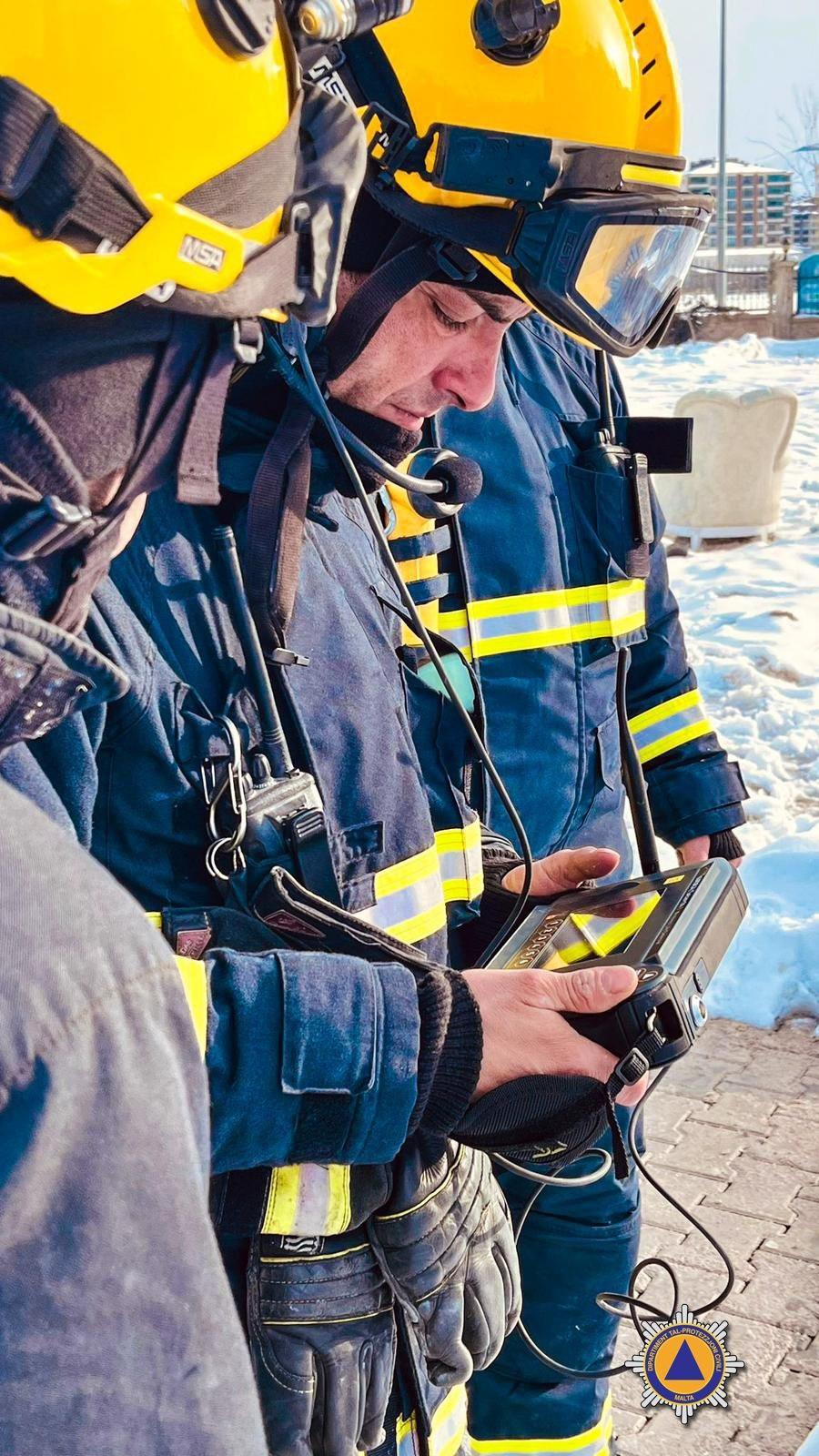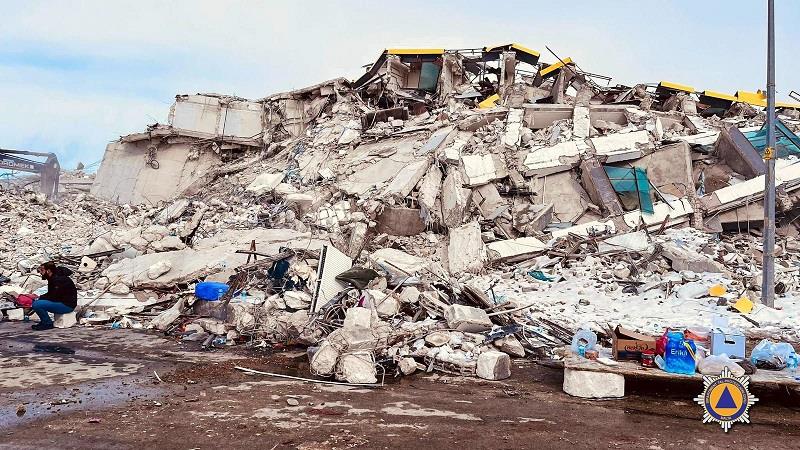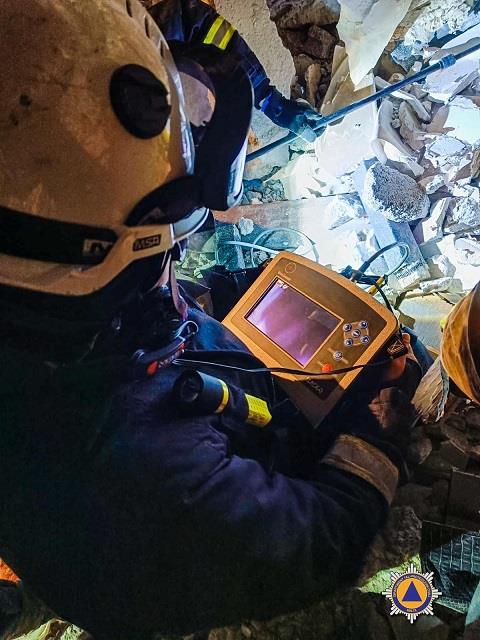A team of 32 CPD officers set off for Malatya, in Turkey on 6 February, to aid in rescue efforts just hours after a devastating 7.8 magnitude earthquake struck, leaving tens of thousands dead.
In an interview with The Malta Independent on Sunday, two members of the Maltese CPD team - Station Officer David Cassar and Leading Officer Jonathan Callus - described their experiences.
“No matter how much time passes and no matter how grave a situation is, our mindset is that we will find someone (alive),” Callus said. “You need to remain as positive as you can be. Despite the situation being what it was, the way the buildings fell, the cold, your mind keeps telling you that you will find someone alive."
The Maltese team found 18 victims while on their mission. "Unfortunately we found nobody alive,” Callus said, but "we left 18 families at peace, knowing that their loved ones were found."
The Maltese team spent a week in Turkey, as part of a rescue effort that saw the international community come together to support both Turkey as well as Syria. On Friday, the Turkish disaster management agency updated the death toll from the earthquake in Turkey to 38,044, raising the overall number of fatalities in both Turkey and Syria to 41,732.

Internationally, stories of people wanting to say goodbye to their loved ones have emerged. The Associated Press (AP) reported one such case: “Hamid Yakisikli had waited outside the pile of concrete that used to be his house since an earthquake devastated his home in the ancient city of Antakya. He and his two brothers have endured freezing conditions, in big jackets and wool hats, waiting for rescuers to retrieve the body of their mother, Fatma, from under the rubble,” the Associated Press wrote on Thursday. “I can’t have peace of mind without burying her,” said Yakisikli. For the Yakisikli brothers, the wait went on for nearly 230 hours, when finally Fatma Yakisikli was pulled from the rubble. Now, they can bury their mother and being trying to move on, AP reported.
On 6 February, nine hours after a decision was taken to send a Maltese team to Turkey, the CPD officers landed in Istanbul and then flew towards their destination, landing in Elazig airport and making the rest of the journey to Malatya by coach. Everything seemed normal in Istanbul, Cassar said, but things changed as they approached their destination almost on the other side of the country. Cassar described the moments they were approaching the disaster zone. “We began seeing the scale of the earthquake... demolished houses, people walking as though they had no idea where they were heading.”
Callus said that the coach ride from Elazig to the area they were assigned took around an hour and a half. “For the first hour, we didn't really see anything out of the ordinary, but then, all of a sudden, we began to see the scale of the disaster.”

“There were so many collapsed buildings, the first thing that came to mind was, where are we going to start? How are we going to start," Cassar said, while adding that the local civil protection team guided them.
Callus said that there was organisational work being done in the background by the governments, embassies and CPD. Callus stressed the importance of the training they had undergone over the years. As an example, he said that "around a week before we went to Turkey, 18 officers had just come back from adverse weather training in Canada - where we went through a simulation depicting a scenario of a plane crash in -35 degrees. That kind of training helped us a lot."
When arriving at their destination, Callus said that they already had the details of the contact persons from the local Civil Protection Department – the Disaster and Emergency Management Presidency (AFAD) - they were going to meet.
“AFAD’s role was to coordinate, and our role was to cooperate," Callus said.

Cassar said that they were very careful to respect the culture of the locals, even in terms of how they worked when, for instance, finding someone while searching in order not to cause further grief to families.
In Malatya there were local rescue teams, and two international teams (including the one from Malta), they said.
"These people went through a disaster, they didn’t know if they would have food to eat tomorrow, yet despite this, they were still bringing us food, coffee, starting fires in barrels... it was -15 degrees all the time. They made you feel like part of their family. That is one of the hardest things to understand, that they are in need and yet they are treating you so well. At no time did we feel in danger, or were hungry, and these are the kind of things we are trained to face,” he said, explaining that the officers travel self-sufficient, even in terms of food and water.
One of the more worrying moments took place while Callus was at base camp, he said. "There were approximately 12 tremors an hour, ranging from one to five on the Richter scale. On one occasion, we felt a very big tremor, and our colleagues were on location conducting a search," Callus said. "Imagine searching through an area that was already perilous, and while you're there, the ground beneath you starts shaking. That was one of the most difficult moments for me. At the time I was at the base of operations,” he said. “We felt the ground shaking and your first thought is 'where are my brothers,'" referring to the rest of the team. He contacted them and they were ok.

"That was one of the scares we had," he said.
At one point in time, the CPD was searching for a missing person in what was a 14-storey apartment block. In under four hours from when they arrived on that site, they found the apartment where the person in question stayed. “We had a starting point," Callus said. One emotional moment came when they found this person's wedding album, and passed it on to his wife, Callus added.
The work had its dangers. Cassar said that on one site, local people wanted to search the area with spades, but, he said, it wasn't safe and the CPD didn't want to enter right away. "There were blocks of concrete above that were being held by mechanical shovels. I told the interpreter that we weren't going in due to the danger, and that it would be good if people also don't search there, as first we should remove the danger.” There then was a tremor, Cassar said, and one person jumped from the height of around a storey, and risked being hurt because of exposed iron. He told the interpreter that this is what they didn't want to happen, as they wanted to look out for the team's safety and also advised people to be safe.

Asked about how such tragedy affected them, Cassar said that he has seen such things in the past, although not on such a large scale. "We've had incidents where I saw people in grave situations (in the past), but when I arrived I needed some time alone, and I even cried, I don't mind saying it," Cassar said.
"No matter how much you train," Callus added, "no matter how much you prepare yourself, it is definitely going to affect you. The good and the bad, the bad obviously more than the good. But we saw so much good from the Turkish people," he said.
The CPD in Malta organised a collection effort for items to send to Syria and Turkey. Collections have now stopped. "We had a massive tent filled and people were packing containers. People felt that they also needed to do their bit, and I would like to tell them thank you for the cooperation they have shown," Cassar said.
